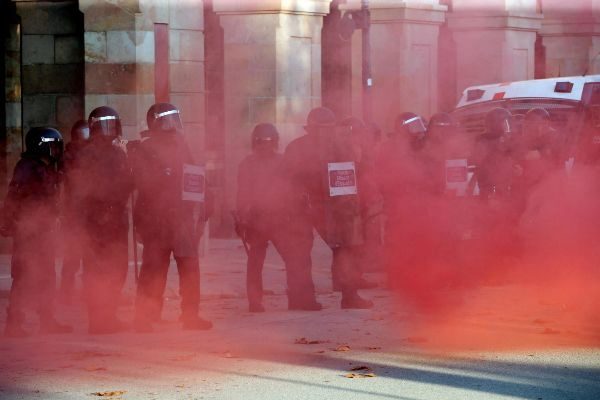- Catalonia: Mossos riot police will use pepper gas in incidents
The Mobile Brigade of the Mossos d'Esquadra are preparing for the next months of mobilizations in the streets of Catalonia with a new way of understanding security: having little interaction with protesters. That is why the material that riot agents will have at their disposal will be reinforced to avoid the conflicting moments and guarantee both the security of the police and the people who participate in these protests.
For this, they intend to use, in situations of great tension and conflict, such as when they are before violent groups and must make their way to an emergency situation, pepper spray. These are gas cylinders that according to the agents is unidirectional and affects specific people. In addition, he notes that it is less harmful than blows with the defense that can cause more trauma. In the case of gas, the person suffers from itching and irritation in eyes, nose and mouth in addition to breathing problems that occur in about 20 minutes, according to the Mossos, after pouring water on the face.
From the Mobile Brigade, it was pointed out that many European police have used this type of gas for years without any serious case of intoxication and that for safety reasons its launch will cause a wall of smoke from which agents can leave before a situation of violence At the moment, the police who are taking courses at the Institut de Seguretat Pública de Catalunya (ISPC) have been instructed in the launch of this type of gas and even launched on them to verify its consequences in the first person. However, the use of this type of material is not new for Mossos. In the manifestation of the general strike of March 2012, in a situation of extreme violence by groups of people, which led to the burning of a cafeteria in the city center, the agents released tear gas that led them to release Old masks.
In this sense, the riot commanders detail that on that occasion the launch of gas was massive to get out of a complex situation so it affected many people and that the new units of sprays that they now have allow to use it towards specific objectives.
A few months later, in January 2013, the Mossos again used pepper gas in the eviction of a squatted ship in the Poblenou neighborhood of Barcelona as they considered that there was quite aggressive resistance, as explained by several agents before the court since a criminal procedure was opened for this action.
The agents will also have fences that a company will locate in the locations they consider and that will allow them to separate from the protesters. These fences, which have a height of one and a half meters, are designed to avoid being easily overcome by people who protest and allow the police line to be fixed. Along with these elements, the Mossos also have a van equipped to inform protesters to clear the area, as happened in the concentration before the Parliament during the afternoon of the Day.
The 'toga operation' will continue in Barcelona
From next week the Mossos d'Esquadra will only maintain permanent surveillance in the Palace of Justice of Barcelona and in the City of Justice, after the Superior Court of Justice of Catalonia (TSJC) ordered the withdrawal of the rest of judicial buildings The court made the decision after studying a police report that indicates that the risk of incidents has been "diluted" so it is no longer necessary to call the operative toga initiated last February after the actions of the CDRs in some courts dumping dumps and manure and making graffiti coinciding with the beginning in the Supreme Court of the trial against the sovereign leaders prosecuted for rebellion.
The decision of the TSJC arrives a few weeks after the judgment is known by this trial. Last May the court agreed to remove surveillance at most venues during the opening hours of the judicial buildings on weekdays, although it was maintained at those in Barcelona, El Vendrell, Gandesa, Balaguer, Cervera, Solsona and Berga. Yesterday it was decided to withdraw it in these courts from outside the Catalan capital, where it will continue to be maintained 24 hours.
Precisely, the president of the TSJC, Jesús María Barrientos, stressed yesterday at the opening of the judicial year in Catalonia, celebrated in Lleida, that justice should serve to "equalize" everyone and that the law will be applied "without prejudice related to the social relevance of the subject to it ».
"Justice is an instrument of peace and harmony, essential for restoring altered harmony and social stability," Barrientos said, adding that the courts must arbitrate "the appropriate corrections on those who seek to appropriate them." In addition, he pointed out that court decisions are "binding and mandatory for all citizens."
Barrientos wanted to respond to attacks on the judiciary by a part of the political class because of the increase in crime in Barcelona. "We have been publicly recriminated to give lukewarm responses to repeat criminal offenses and, also, for not adopting precautionary prison measures for detainees for violent robbery," he said and stressed that judges cannot adapt to "social demand , but to the legality of the moment that prevents custodial sentences for their authors ». That is why he concluded that "the data is not true, nor just the criticism from which it is intended to relate the judges to the high levels of crime."
According to the criteria of The Trust Project
Know more- Mossos d'Esquadra
- Barcelona
- Catalonia
- Supreme Court
- Diada
- CDR
- World
PoliticsC denounces the "partisan use" of the Mossos for identifying the activists who put the Spanish anthem
PoliticsTorra calls "mow the chains" and "exercise self-determination"
Catalonia Separatist punch before the sentence of the procés

